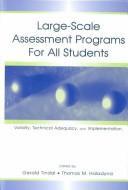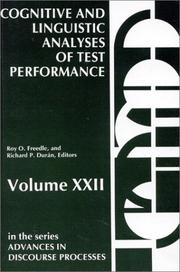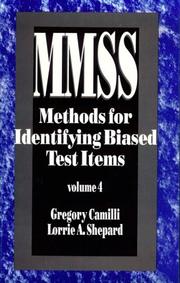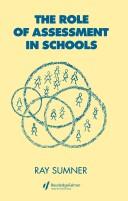| Listing 1 - 10 of 20 | << page >> |
Sort by
|
Book
ISBN: 1617352691 9781617352690 9781607522270 1607522276 9781607522287 1607522284 Year: 2009 Publisher: Charlotte, NC Information Age Pub.
Abstract | Keywords | Export | Availability | Bookmark
 Loading...
Loading...Choose an application
- Reference Manager
- EndNote
- RefWorks (Direct export to RefWorks)
Examinations --- Test results --- Test validity --- Validity of examinations --- Validity. --- Interpretation
Book
ISBN: 1282985523 9786612985522 9264091459 9264091440 Year: 2010 Publisher: [Paris] : OECD,
Abstract | Keywords | Export | Availability | Bookmark
 Loading...
Loading...Choose an application
- Reference Manager
- EndNote
- RefWorks (Direct export to RefWorks)
This first volume of PISA 2009 survey results provides comparable data on 15-year-olds' performance on reading, mathematics and science across 65 countries. The volume opens with an introduction explaining what PISA is and how PISA 2009 is different from previous PISA surveys. The introduction also explains what PISA 2009 measures and how. A reader's guide provides information needed to interpret the data. Chapter 2 provides a summary of the findings related to performance in reading, the focus of the 2009 survey. Chapter 3 provides a summary of the findings related to performance in mathematics and science. A final chapter explores policy implications in five areas: low performance, pursuing excellence, strengths and weaknesses in different kinds of reading, student performance in math and science, and the potential to improve performance across the world. Annexes provide detailed statistical data and technical information.
Education --- Social Sciences --- Theory & Practice of Education --- Examinations --- Interpretation. --- Interpretation of examinations --- Test interpretation --- Test results --- Validity
Book
ISBN: 1681238950 9781681238951 9781681238937 9781681238944 Year: 2017 Publisher: Charlotte, NC
Abstract | Keywords | Export | Availability | Bookmark
 Loading...
Loading...Choose an application
- Reference Manager
- EndNote
- RefWorks (Direct export to RefWorks)
Test bias. --- Examinations --- Test results --- Test validity --- Validity of examinations --- Bias in tests --- Prejudice in testing --- Discrimination in education --- Educational tests and measurements --- Validity. --- Interpretation --- Validity --- Test fairness
Book
ISBN: 3038977594 Year: 2019 Publisher: Basel, Switzerland : MDPI - Multidisciplinary Digital Publishing Institute,
Abstract | Keywords | Export | Availability | Bookmark
 Loading...
Loading...Choose an application
- Reference Manager
- EndNote
- RefWorks (Direct export to RefWorks)
Why do we need more questionnaires to measure aspects of spirituality/religiosity when we already have so many well-tried instruments in use? One answer is that research in this field is growing and that new research questions continuously do arise. Several of these new questions cannot be easily answered with the instruments designed for previous questions. The field is expanding and, consequently, the research topics. Meanwhile several multidimensional instruments were developed which cover existential, prosocial, religious and non-religious forms of spirituality, hope, peace and trust-and several more. The 'disadvantage' of these instruments is the fact that some are conceptually broad and often rather unspecific, but they might be suited quite well for culturally and spiritually diverse populations when the intention is to compare such diverse groups. This is the reason why more research on new instruments is needed as can be found in this Special Issue, and to stimulate a critical debate about their pros and cons.
Religion and science. --- Examinations --- Validity. --- Test results --- Test validity --- Validity of examinations --- Christianity and science --- Geology --- Geology and religion --- Science --- Science and religion --- Interpretation --- Religious aspects

ISBN: 1138866644 1282378635 9780585419574 1410605116 9786612378638 1135653895 0585419574 9780585419572 0805837094 9780805837094 9781410605115 9781138866645 9781282378636 6612378638 9781135653897 9781135653842 9781135653880 1135653887 Year: 2002 Publisher: Mahwah, N.J. L. Erlbaum
Abstract | Keywords | Export | Availability | Bookmark
 Loading...
Loading...Choose an application
- Reference Manager
- EndNote
- RefWorks (Direct export to RefWorks)
The need for a comprehensive volume that reviews both the processes and issues involved in developing, administering, and validating large-scale assessment programs has never been greater. These programs are used for many purposes, including instructional program evaluation, promotion, certification, graduation, and accountability. One of the greatest problems we face is how to deal with special needs and bilingual populations. Examining these processes and issues is the mission of this book. It is organized into the following five sections: Introduction, Validity Issues, Technical Issues, Imp
Examinations --- Educational tests and measurements. --- Educational assessment --- Educational measurements --- Mental tests --- Tests and measurements in education --- Psychological tests for children --- Psychometrics --- Students --- Psychological tests --- Test results --- Test validity --- Validity of examinations --- Validity. --- Rating of --- Interpretation
Book
ISBN: 1351064762 1351064789 1138479756 Year: 2020 Publisher: New York ; London : Routledge, Taylor & Francis Group,
Abstract | Keywords | Export | Availability | Bookmark
 Loading...
Loading...Choose an application
- Reference Manager
- EndNote
- RefWorks (Direct export to RefWorks)
Integrating Timing Considerations to Improve Testing Practices synthesizes a wealth of theory and research on time issues in assessment into actionable advice for test development, administration, and scoring. One of the major advantages of computer-based testing is the capability to passively record test-taking metadata-including how examinees use time and how time affects testing outcomes. This has opened many questions for testing administrators. Is there a trade-off between speed and accuracy in test taking? What considerations should influence equitable decisions about extended-time accommodations? How can test administrators use timing data to balance the costs and resulting validity of tests administered at commercial testing centers? In this comprehensive volume, experts in the field discuss the impact of timing considerations, constraints, and policies on valid score interpretations; administrative accommodations, test construction, and examinees' experiences and behaviors; and how to implement the findings into practice. These 12 chapters provide invaluable resources for testing professionals to better understand the inextricable links between effective time allocation and the purposes of high-stakes testing. The Open Access version of this book, available at https://www.taylorfrancis.com, has been made available under a Creative Commons Attribution-Non Commercial-No Derivatives 4.0 license.
Examinations --- Educational tests and measurements --- Validity. --- Educational assessment --- Educational measurements --- Mental tests --- Tests and measurements in education --- Psychological tests for children --- Psychometrics --- Students --- Psychological tests --- Test results --- Test validity --- Validity of examinations --- Rating of --- Interpretation

ISBN: 0893913669 Year: 1987 Volume: 22 Publisher: Norwood Ablex
Abstract | Keywords | Export | Availability | Bookmark
 Loading...
Loading...Choose an application
- Reference Manager
- EndNote
- RefWorks (Direct export to RefWorks)
Examinations --- Linguistic analysis (Linguistics) --- Cognition in children --- Evaluation --- Interpretation --- Analysis, Linguistic (Linguistics) --- Analysis (Philosophy) --- Grammar, Comparative and general --- Interpretation of examinations --- Test interpretation --- Test results --- Competitive examinations --- Tests --- Questions and answers --- Educational tests and measurements --- Cognition (Child psychology) --- Thought and thinking in children --- Child psychology --- Validity

ISBN: 0803944160 Year: 1994 Publisher: Thousand Oaks (Calif.): Sage
Abstract | Keywords | Export | Availability | Bookmark
 Loading...
Loading...Choose an application
- Reference Manager
- EndNote
- RefWorks (Direct export to RefWorks)
303.72 --- #SBIB:303H520 --- Vormen van analyse --(sociaal onderzoek) --- Methoden sociale wetenschappen: techniek van de analyse, algemeen --- Examinations --- Test bias --- Validity. --- Evaluation. --- 303.72 Vormen van analyse --(sociaal onderzoek) --- Bias in tests --- Prejudice in testing --- Discrimination in education --- Educational tests and measurements --- Test results --- Test validity --- Validity of examinations --- Validity --- Evaluation --- Interpretation

ISBN: 1135799776 0585452954 1280405333 9786610405336 0203480333 9780203480335 9780585452951 6610405336 9780700512638 0700512632 0700512632 9781135799724 9781135799762 9781135799779 9781138421462 1135799768 Year: 1991 Publisher: Windsor, Berkshire, England Neer-Nelson
Abstract | Keywords | Export | Availability | Bookmark
 Loading...
Loading...Choose an application
- Reference Manager
- EndNote
- RefWorks (Direct export to RefWorks)
The Role of Assessment in Schools looks at the conceptual aspects of tests and testing and also gives practical guidelines on how to use tests to their best effect. It provides a wide-ranging discussion of the development of tests, the types and scope of tests, their application and interpretation, and answers questions such as: Who wants testing? Is the test appropriate? Is the test biased? Are the results consistent?
Educational tests and measurements. --- Examinations --- Interpretation of examinations --- Test interpretation --- Test results --- Test construction --- Test design --- Educational assessment --- Educational measurements --- Mental tests --- Tests and measurements in education --- Psychological tests for children --- Psychometrics --- Students --- Psychological tests --- Design and construction. --- Interpretation. --- Validity --- Rating of
Book

ISBN: 0813575893 9780813575896 Year: 2019 Publisher: New Brunswick, NJ
Abstract | Keywords | Export | Availability | Bookmark
 Loading...
Loading...Choose an application
- Reference Manager
- EndNote
- RefWorks (Direct export to RefWorks)
Precision medicine is rapidly becoming the standard-of-care for the treatment of cancer patients. This is made possible, in part, by the ready availability and reasonable costs of comprehensive DNA and RNA sequencing assays. However, precision medicine is complex and incorporates entirely new types of data and treatment paradigms that are outside of the training of most oncologists in practice today. Precision Medicine Oncology: A Primer is a concise review of the fundamental principles and applications of precision medicine, intended for clinicians, particularly those working in oncology. It provides an accessible introduction to the technological advances in DNA and RNA sequencing, gives a detailed overview of approaches to the interpretation of molecular test results and their point-of-care implementation for individual patients, and describes innovative clinical trial designs in oncology as well as characteristics of the computational infrastructures through which massive quantities of data are collected, stored, and used in precision medicine oncology.
Tumors --- Medical Oncology --- Precision Medicine --- Neoplasms --- Tumours --- Pathology --- Cysts (Pathology) --- Oncology --- therapy. --- Individualized medicine --- Personalized medicine --- Medical care --- Pharmacogenetics --- Medicine, oncology, precision medicine, cancer, cancer treatment, cancer patients, clinicians, medical practice, DNA, RNA, comprehensive DNA sequencing, comprehensive RNA sequencing, technological advances, molecular test results, oncologists, medical students, fellows in oncology, nurses, physician assistants, molecular tumor board, next-generation sequencing, comprehensive genomic profiling, individualized medicine.
| Listing 1 - 10 of 20 | << page >> |
Sort by
|

 Search
Search Feedback
Feedback About UniCat
About UniCat  Help
Help News
News